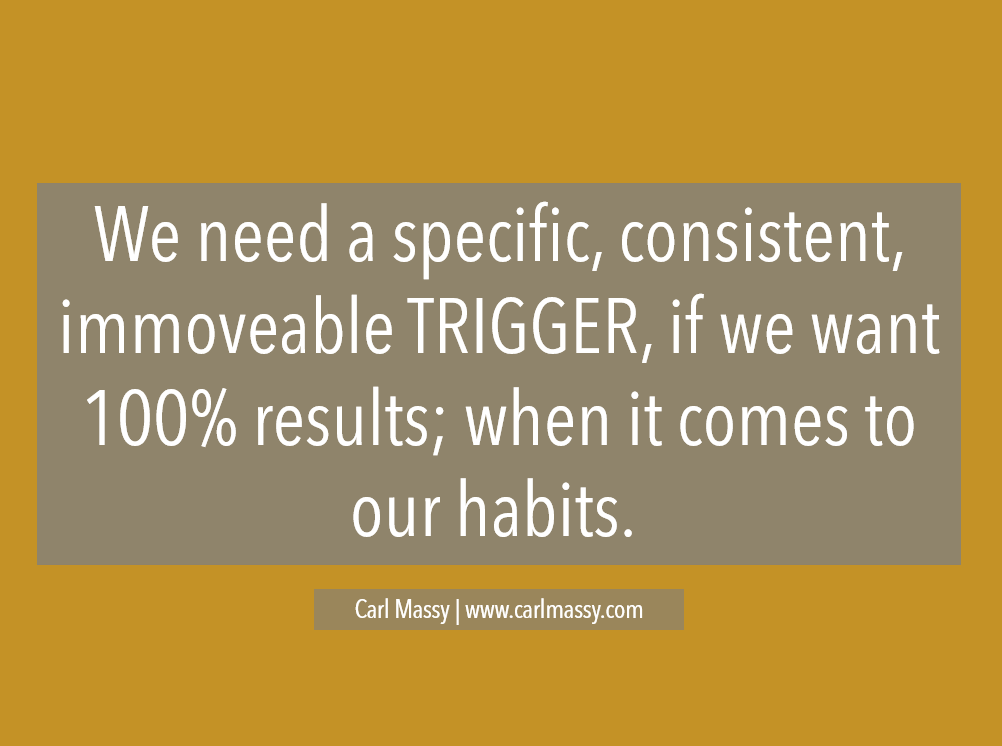
“We are what we repeatedly do. Excellence, then, is not an act, but a habit.” Aristotle (Greek Philosopher)
I thought it might be cool to start off with some ancient wisdom.
Which also highlights that the conversation about HABITS – and their importance – has been going on for millennium.
So, nothing new.
However; there are parts to the ‘good habit building‘ thing, which are important to know, but even more important to actually PRACTICE.
The context, or impetus, for today’s discussion, was a recent personal experience.
As you probably know, I spent 14-years in the Australian Army, where discipline was a big thing (obviously).
But the truth is, my dad was super disciplined, so I was actually taught the virtue of discipline for 17 years, before I even donned my Army greens.
My point being; I have a pretty high level of discipline.
Also, recently I completed a yoga teacher training course, where at the end I made a commitment to myself to do a daily practice for 1-year, to confirm for me the effectiveness of the methodology I had been taught (i.e. Traditional Hatha Yoga).
So, I made a commitment to myself (which I am good at honouring), plus I have a high sense of disciple, HOWEVER a couple of weeks ago and 90+ days into my year-long daily commitment, I just “FORGOT” to do my daily yoga practice.
WTF?!?!
One would think with such a high level of disciple, I would have not missed a beat.
Therefore, it would seem (since reality is showing me), that having high levels of discipline is not enough when it comes to performing Habits.
That, my friends, is the topic of today’s conversation.
Who or what is pulling the Trigger?
In the past I have highly recommended a book by BJ Fogg, called “Tiny Habits“, and I have included his model (below the text) for your information.
He suggests, that to create a Behaviour (B) – through a habit – there needs to be 3 things.
Motivation, Ability and Prompts (B = MAP).
Today I want to focus on the element that wasn’t present, when I missed my daily yoga ritual.
I obviously had the Motivation and Ability, as I had already been doing it for 3 months.
And some yogic teachings even suggest that after 40-days of repetition, the habit is “formed” neurologically in the brain and body.
Obviously, a habit is ‘potentially‘ formed, but not an absolute 100% guarantee.
The thing that slipped me up was the “Prompt” or as I like to call it, the “TRIGGER“.
I normally do my yoga practice first thing in the morning, after I have done my ablutions (too much info? ;-)).
On the fateful day I “forgot” to do my practice, I had other essential stuff happening in the morning; so I said to myself that I would do it later in the afternoon, when I had the time.
On a normal day, my TRIGGER is waking up, then ablutions, then my energization exercises, and then yoga (effectively an unbroken habit chain, initiated by the initial trigger of waking up).
The day I forgot, I had no specific Trigger in the afternoon, to make the daily habit kick into gear.
Without a set Trigger, to activate our good habits, our habits are unlikely (or much more unlikely) to happen.
We need a specific, consistent, immoveable Trigger, if we want 100% results; when it comes to our habits.
Meaning, we don’t really have an embedded habit, if we don’t understand the complete strategy of habit forming and activation.
We need all three: Motivation (or discipline), Ability and Prompts (a Trigger).
The Takeaway for you
Is there a “good” habit you are trying to integrate into your life, where you are missing – like me – the right consistent Trigger (or for you, is it Motivation or Ability)?
Have a look any habits you are trying to form, and try an understand what might be missing.
Then add the missing ingredient.
And for many people BJ Fogg’s approach to “Tiny Habits”, works very effectively, so do check out his work.
For me, the right TRIGGER is king, but for you it might be something else.
And to bring the conversation full circle, let’s finish with a quote by one of my favourite authors – Steven Pressfield (he wrote The War of Art about “resistance”)
“The difference between an amateur and a professional is their habits. An amateur has amateur habits. A professional has professional habits.”
Cool!
In Summary
Discipline is not enough when it comes to (good) habits.
If you don’t have a (100%) reliable “Trigger” to initiate your good habits, they are unlikely to be consistent.
BJ Fogg (rightly) suggests that Behaviour = Motivation + Ability + Prompts

Habits are important for not only getting results, but attaining them with the least amount of energy.
My Parting Words
Since I am a fan of Daily Routines (when it comes to sustainable success), I thought I would also include a quote by John C. Maxwell who often writes about Leadership:
“You’ll never change your life until you change something you do daily. The secret of your success is found in your daily routine.“
Go the daily routine!
And, as I alluded to in our conversation, one of the best “habit strategies” is to anchor as many things to an unbroken chain of habit performance, which is TRIGGERED by waking up in the morning.
Hence my focus on MORNING routines, as opposed to daily routines.
We will always have the Trigger of “waking up” to kick off our daily habits.
It was a humbling reminder to me the other week, when I “forgot” to honour my commitment to myself.
It reminded me there is more to success than being disciplined.
It reminded me of the importance of systems, processes, and strategies, to increase our levels of success.
Especially, in our busy and distracting modern world, which pulls our attention in all sorts of directions.
So, when would now be a great time to increase the stickiness of your most high-ROI Habit?
Have fun experimenting with it.
And do reap the rewards of your effort.
Have a truly delightful day, and a week tuning into your most high-ROI habit.
Take care.
Carl
Quotable QUOTE:
“We need a specific, consistent, immoveable trigger, if we want 100% results; when it comes to our habits.” Carl Massy
(Author of 18 Ways We Make Life WAY Harder Than It Needs To Be)
PS: Have you read or listened to this book yet? 18 Ways We Make Life WAY Harder Than It Needs To Be

